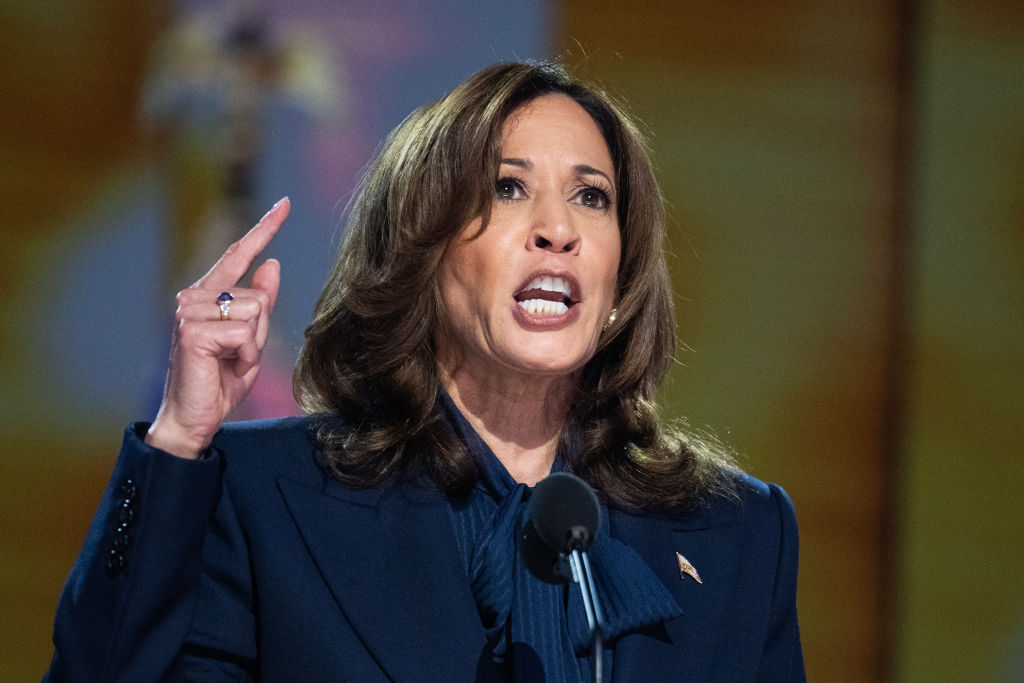As the Democratic National Convention wraps up in Chicago this week, Kamala Harris and Donald Trump are preparing for a final sprint over the next 74 days. In this time, they will compete for the small slice of the country’s electorate living in battleground states who will decide the presidential election. A key focus of both candidates’ messages to these voters is likely to be the economy, and over the past week we’ve had a sense of what this will look like for the Democrats. That is, an attempt to reclaim economic populism.
This has been evident in a couple of ways. For a start, the party is embracing organized labor — longtime allies of Harris — more tightly than ever. At the outset of the convention, presidents of several of the country’s top unions took turns enthusiastically endorsing her as attendees held signs and chanted: ‘Union yes!’ A prime speaking slot went to Shawn Fain, president of the United Auto Workers, whom Donald Trump made a point of attacking during his own convention speech. In addition to endorsing Harris, Fain took the opportunity to lay into the GOP nominee, calling him a ‘scab’ and asserting that it has been much easier for workers to organize under Joe Biden than under his White House predecessor.
The prominence of labor at the convention is a sign Democrats understand that the institution remains one of their last remaining lifelines to the working class — and that they have work to do to shore up the support of union households, which have been slipping away from them towards Trump. In 2020, Biden won 56% of these voters, marking the second-lowest vote share for a Democratic nominee in nearly 30 years, besting only Hillary Clinton’s 51%. A major driver of this has been the Rightward swing among white union voters, who are more culturally conservative than the Democrats’ base. It remains to be seen whether the party’s overtures on workers’ issues are enough to bridge that divide, but they certainly can’t hurt.
Additionally, Harris has begun rolling out an economic policy agenda for her second term that aims to address a key issue for voters, including those who are undecided: the cost of living. Specifically, she claimed last night that she will work to ‘create jobs, grow our economy, and lower the cost of everyday needs like health care, housing, and groceries’. This includes going after corporations that practice price-gouging, both by imposing penalties on rule-breaking companies and cracking down on unfair mergers which have helped consolidate the food industry. Though economists have broadly pushed back, saying the causes of inflation are multifaceted, many voters — including a majority of Republicans — are supportive.
Harris’s other major policy rollout was designed to help blunt the rising cost of housing. At the core of this idea is an expansion of the nation’s housing supply, which she would facilitate by offering a tax credit to homebuilders who sell starter homes to first-time buyers. This would be coupled with $25,000 in down-payment assistance to first-time buyers, something that Republicans in Congress have already shot down as an inflationary measure but that a majority of Americans support.
Among Harris’s most populist measures is a call to raise $5 trillion in taxes by increasing the burden of the wealthiest Americans and corporations. Though similar calls to reduce income inequality and the national deficit via a more progressive tax code have previously faced rocky political terrain in Congress, most Americans — including a near-majority of Republicans — are supportive. Perhaps just as importantly, swing voters say this policy is among those likeliest to move them to vote for Harris. She also plans to complement this with a middle-class tax cut.
Despite the emergence of these plans over the past week, all of which poll well, Harris’s convention speech last night somewhat inexplicably failed to mention any of these measures except the tax cut, marking a missed opportunity to connect with viewers who did not know much about her agenda. To the extent that the Vice President touched on policy, she spoke in platitudes about ‘lowering costs’, ‘ending the housing shortage’, and ‘providing access to capital’ for small businesses and entrepreneurs — all laudable ideas but without much substance for voters to consider.
Heading into the home stretch of the campaign, voters continue to say they trust Trump more than Harris to handle economic issues. But Harris has a clear and popular agenda that could tip the scales more in her favor. She also has a massive war chest with which to communicate this message to the handful of undecided voters who will determine the next president. Pushing a more populist vision of the Democratic Party than we’ve seen in recent years is likely to help her make inroads with these voters; time will tell if it’s enough.











Join the discussion
Join like minded readers that support our journalism by becoming a paid subscriber
To join the discussion in the comments, become a paid subscriber.
Join like minded readers that support our journalism, read unlimited articles and enjoy other subscriber-only benefits.
Subscribe